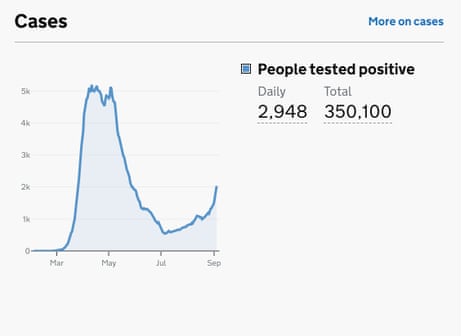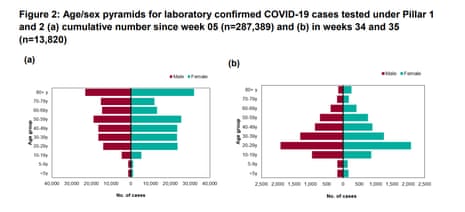Afternoon summary
That’s all from me for today.
Our coverage continues on our global coronavirus live blog.
New cases show continued rise in new infections; Grant Shapps says seven Greek islands will be added to list on Wednesday
That’s all from me for today.
Our coverage continues on our global coronavirus live blog.
According to a YouGov poll, only a quarter of voters agree with Boris Johnson’s claim that leaving the transition period without an EU trade deal would be good for the UK. Twice as many - half the population - think it would be a bad outcome, the poll suggests.
Boris Johnson has said that not reaching a trade deal with the EU would still represent a good outcome - but Britons disagree.
— YouGov (@YouGov) September 7, 2020
By 50% to 24% they say a no deal would be a bad outcome https://t.co/65Dks7OBqK pic.twitter.com/P3DiOGJ0Rt

Two men have been arrested and charged in connection with a house party that attracted more than 300 people in Midlothian nine days ago.
Police Scotland did not disclose what the two men, aged 20 and 29, had been charged with but said they would appear in court at a later date.
Officers launched a criminal investigation into the event at a mansion near Gorebridge, Midlothian, and warned that its organisers could face charges of reckless and culpable conduct.
The police raided Mansion House, a former family home, early on the morning of Sunday 30 August after neighbours complained there was a huge rave taking place at the property. It was broken up by police, who issued a fixed penalty notice to an organiser, aged 29.
Despite repeated warnings from Police Scotland and Nicola Sturgeon, the first minister, for people to avoid house parties, the force said it had attended 391 house gatherings last weekend, a 23% increase over the last weekend of August. Officers issued 18 fixed penalty notices.
Gastrointestinal symptoms are common in children infected with coronavirus and should trigger tests for the virus, research published in the British Medical Journal argues.
Gastrointestinal symptoms, including diarrhoea, vomiting, and abdominal cramps, are common in children infected with SARS-CoV-2 and should trigger tests for the virus, researchers have saidhttps://t.co/Hb5F3FUGp8
— The BMJ (@bmj_latest) September 7, 2020
After the coronavirus new case numbers were published yesterday, showing a huge increase, Ewan Birney, deputy director general at the European Bioinformatics Institute, published a useful Twitter thread putting the figures in context. It is just a relevant today as it was yesterday. It starts here.
Dear UK Journalists. I suspect some of you are going to be rightly asked to write up the striking jump in SARS-CoV-2 cases registered today by PHE, and quite rightly. This is the "raw" case plot data. Some notes on this: pic.twitter.com/G4ssEW0IHp
— Ewan Birney (@ewanbirney) September 6, 2020
This is probably the key point - making the point that the April official figures vastly unrepresented the real number of coronavirus infections in the community, while the current ones, while still an understatement, are much closer to reality.
Crudely the April numbers should be 10-50 fold higher than reported for real infections whereas the current cases are something like 2-4 fold (we know this from the random survey the ONS does across the UK). Need some pro-modellers to narrow those numbers (paging @AdamJKucharski)
— Ewan Birney (@ewanbirney) September 6, 2020
In an article for the Guardian Mujtaba Rahman, the Brexit expert at the Eurasia Group consultancy, says that for all the bluster, Boris Johnson needs a Brexit deal. Here’s an extract.
Business leaders are also lobbying MPs, warning that a double “Covid-19 and no deal” blow would be disastrous for jobs. This plays into the politics. Tory MPs representing the former Labour heartland seats in the North and Midlands are unnerved by surveys suggesting they would be among areas hit hardest by no deal. As one of them put it: “The message has been relayed to No 10. It needs to get it.”
These factors will push Johnson towards compromise by the real deadline, which is mid-November. This is because in order to implement the deal by 1 January, six to eight weeks will be needed to convert the political agreement into legal text. This text will then have to be “scrubbed” – reviewed by lawyers on both sides for accuracy, consistency and meaning – translated into the union’s 24 official languages and signed off by the European parliament.
But even mid-November does not leave the two sides much time. Unfortunately, until then Europe will remain trapped in a guessing game. Because, as one senior EU official tells me: “Not one political figure or official in Brussels or any EU capital can vouch for the real intentions of the government.”
And here is the full article.

A further 2,948 people have tested positive for coronavirus. (See 4.34pm.) The figure falls only slightly short of the 2,988 cases reported on Sunday - itself the highest daily total since May.
The increase has occurred even though cases reported on Sundays and Mondays are generally lower than the rest of the week due to lower levels of testing over the weekend and reporting delays.
While the number of tests carried out has risen over time since Covid-19 first reached the UK, experts have previously said the increase in testing does not fully explain the recent rise in cases.
The uptick comes as reports grow of people being advised to take long journeys to get a coronavirus test.
On Sunday Prof Gabriel Scally, a former NHS regional director of public health for the south-west said the government had “lost control of the virus”. He said:
It’s no longer small outbreaks they can stamp on. It’s become endemic in our poorest communities and this is the result. It’s extraordinarily worrying when schools are opening and universities are going to be going back.
The government has just updated its daily coronavirus dashboard.

In the comments RewildScotland questions whether it is really the case that young people are now driving the rise in infections, as Matt Hancock, the health secretary, said on LBC this morning. (See 10.49am.) S/he points out that young people weren’t being tested much earlier on, so perhaps we weren’t aware how many of them were infected then?
Hi Andrew.
Regarding the virus and young people:
"This is not “extraordinary”: in March/April tests were only available to hospital patients (who were sickest & elderly). Antibody studies by @profhelenward & colleagues show young were affected in Mar/Apr. The young may have been “silent spreaders” then."
https://twitter.com/DrRobDickinson/status/1302181319376592897?s=19
Put simply we weren't testing young people back in March so we don't really know if the demographics of positive tests at the moment are different to those back in March.
Perhaps we are seeing the whole ice berg now, when in March we were just focused on the bit we could see above the waterline.
This chart, from the Public Health England weekly surveillance report (pdf) published at the end of last week, sheds light on what is actually happening. The chart on the left, illustrating cumulative infection rates, by age, since the pandemic started, shows that, broadly, infections have hit young adults just as much as older adults. But the chart on the right, showing infection rates in the second half of August (weeks 34 and 35 - the fortnight ending 30 August), proves that the age group with the highest rate of infections at the moment are 20 to 29-year-olds.

The Department for Transport press release about Grant Shapps’ announcement has now arrived. This is what it says about the inclusion of the seven Greek islands on the quarantine list for England.
The first changes under the new process were also made today, with seven Greek islands to be removed from exemption list – Lesvos, Tinos, Serifos, Mykonos, Crete, Santorini and Zakynthos. People arriving in England from those islands from Wednesday 9 September 04.00am will need to self-isolate for two weeks. Data from the Joint Biosecurity Centre and Public Health England has indicated a significant risk to UK public health from those islands, leading to Ministers removing them from the current list of travel corridors.
At the same time, the Foreign, Commonwealth & Development Office (FCDO) has updated its travel advice for Greece to advise against all but essential travel to Lesvos, Tinos, Serifos, Mykonos, Crete, Santorini and Zakynthos. The rest of Greece remains exempt from the FCDO’s advice against all non-essential international travel.
Shapps says he is not lifting quarantine for Spain’s Canary or Balearic islands.
He says there might have been a case for this when quarantine was imposed on Spain. But the number of cases in country has risen sharply, he says, and now it has 127 cases per 100,000. He say it is not safe to reduce quarantine for those islands.
But the new policy means the government can impose quarantine on certain Greek islands, while exempting mainland Greece. He says on Wednesday quarantine will be imposed on arrivals from seven Greek islands.
Shapps does not name the seven islands, but the Sun’s Harry Cole has a list.
Lesvos, Tinos, Serifos, Mykonos, Crete, Santorini and Zakynthos removed from air corridor exemption list.
— Harry Cole (@MrHarryCole) September 7, 2020
Shapps says in July and August the government could not assess the risk within particular regions in countries.
But, as the JCB has strengthened, it has obtained better data. It can take a more granular approach, he says.
He says this means he has been able to consider the case for regional rules, not country-wide rules.
But people can move around, he says.
He says that means he cannot introduce regional travel corridors from within countries.
But the situation is different for islands. He says from today the government has the capacity to vary quarantine rules for islands.
He says four principles will apply.
First, the exemptions must apply to an island.
Second, data must be robust.
Third, the islands must have direct flights - or secure transport.
Fourth, it must be possible to apply the policy.
Shapps is, of course, only referring to policy for England.
Comments (…)
Sign in or create your Guardian account to join the discussion